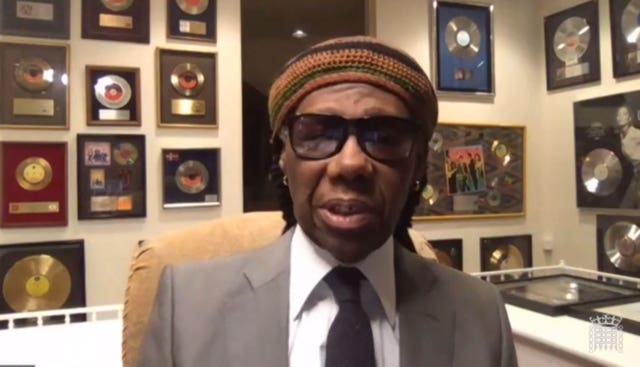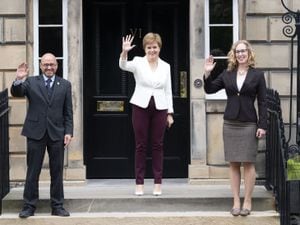Music streaming model requires ‘complete reset’, report concludes
MPs say they have ‘deep concerns’ about the position of the major music companies in the market.

The music streaming model is in need of a “complete reset” in order to properly reward musicians and songwriters, an inquiry has concluded.
The Digital, Culture, Media and Sport Committee’s report on the economics of streaming warns “pitiful returns” from the current system are impacting the “entire creative ecosystem”.
It says some successful and critically acclaimed musicians are seeing “meagre returns” from their work and non-featured performers on songs are being “frozen out altogether”.

The report also raises “deep concerns” about the position of the major music companies in the market, and calls on the Government to refer the case to the Competition and Markets Authority (CMA) to launch a market study into the “economic impact of the majors’ dominance”.
Major record labels Sony Music, Warner Music and Universal Music appeared before MPs during the sessions, while tech giants Spotify, Amazon, Apple and YouTube also gave evidence.
Responding, a CMA spokesperson said: “The CMA strongly supports competitive digital markets.
“We will consider carefully the recommendations in the report that relate to the CMA, and we will work with DCMS to respond to these in due course.”
In the report, MPs called on the Government to introduce a system of equitable remuneration for streaming income – where performers have a right to receive a share without reference to their label contracts.
According to the Broken Record campaign, under the current system artists receive around 16% of the total income from streams, while record companies receive around 41% and streaming services around 29%.
MPs described discussion of alternative payment systems during the inquiry – such as the user-centric model whereby the more a certain artist gets listened to, the more they get paid – as “compelling”, but stopped short of making a recommendation.

However, they voiced concern that current contracts between the major music companies and the streaming giants could stifle further innovation “if misused”.
The inquiry, which was launched following increased scrutiny prompted by the Covid-19 pandemic, received more than 300 pieces of evidence including from Chic star Nile Rodgers, Radiohead guitarist Ed O’Brien, Elbow frontman Guy Garvey and singer-songwriter Nadine Shah.
One session saw Shah become emotional as she spoke of how her earnings from streams alone were not enough to keep “the wolf away from the door”.
The report also recommends that:
– Measures are introduced allowing music creators to recapture the rights to their work from labels after a period of time.
– Artists are given the right to adjust their contract if their work was successful beyond the remuneration they received.
– Government should introduce legally enforceable obligations to normalise licensing arrangements for user-generated content-hosting services such as YouTube.
– Government should require publishers and collecting societies to publish royalty chain information to provide transparency to artists about how much money is flowing through the system.

Chair of the DCMS Committee Julian Knight said: “While streaming has brought significant profits to the recorded music industry, the talent behind it – performers, songwriters and composers – are losing out.
“Only a complete reset of streaming that enshrines in law their rights to a fair share of the earnings will do.
“However, the issues we’ve examined reflect much deeper and more fundamental problems within the structuring of the recorded music industry itself.
“We have real concerns about the way the market is operating, with platforms like YouTube able to gain an unfair advantage over competitors and the independent music sector struggling to compete against the dominance of the major labels.
“We’ve heard of witnesses being afraid to speak out in case they lose favour with record labels or streaming services. It’s time for the Government to order an investigation by the Competition and Markets Authority on the distortions and disparities we’ve uncovered.”

Gomez musician Tom Gray, who founded the #BrokenRecord campaign and gave evidence, welcomed the contents of the report.
He told the PA news agency: “The report brilliantly and coherently cuts to the chase. The music industry has a serious problem. Profits are soaring, the value of this once piracy-blighted market is forecast to, within a decade, eclipse anything seen in our lifetimes, but performers and songwriters are being left behind.
“As we’ve repeated (like a broken record) it’s a failing market where corporations have little incentive to share their extraordinary profits with the architects of their success: musicians.”
Horace Trubridge, general secretary of the Musicians’ Union, said: “This cross-party report is revolutionary. It grasps the issue, identifies the problems and recommends achievable and practical solutions, which won’t cost the taxpayer a penny.
“It’s time to make the most of this rare, cross-party consensus, bring British copyright law up to date, show global Britain leading the fight to protect the intellectual property of artists and creators, and make the UK the best place to be a musician.”
Crispin Hunt, chairman of The Ivors Academy for songwriters and composers, said: “Today is a great day for musicians and music creators. This cross-party report gives the Government the firepower and political mandate it needs to secure the commercial, professional and artistic futures of many thousands of British music creators, and to keep their value here in Britain.
“For too long, foreign-owned major record labels have recklessly gambled with the UK music economy and the future of British music. The true innovators and creators are our musicians and composers, and by acting on the committee’s thoughtful recommendations, the Government will do so much good for so many – musicians and listeners alike.”
Paul Pacifico, chief executive of the trade body Association of Independent Music, said: “The select committee has impressively zeroed in on some of the key issues in music and many of the report’s findings endorse and vindicate the ethical practices of the independent music community.
“The independent community is founded on fair dealing and we believe the MPs have tried to make recommendations that benefit creators in good faith.
“However, our view is that equitable remuneration will not deliver the outcome they are hoping for. It is a 20th century solution not fit for the 21st century digital market and will leave the next generation of artists worse off.
“We look forward to examining the findings in detail and continuing to work with all our partners in music and beyond to deliver successful, strong, inclusive and diverse outcomes for music.”
YouTube Music’s global head of music Lyor Cohen said: “We recognise the role that YouTube Music plays within the music industry and are deeply committed to helping it grow and thrive.
“In the last 12 months alone we’ve paid out more than four billion dollars to artists, songwriters and rights holders, 30% of which has come from UGC [user generated content], with fan-made videos proving to be an invaluable source of revenue.
“We are spearheading the twin-engine model of ads and subs, allowing music fans around the world to pay with both their wallets and their eyeballs.”
Geoff Taylor, chief executive of record labels association BPI, said: “Labels are committed to ensuring that artists share fairly in the growth from streaming.
“We will carefully examine the findings of this report, but it is essential that any policy proposals avoid unintended consequences for investment into new talent, and do not imperil this country’s extraordinary global success in music.”
A Government spokeswoman said: “We welcome the select committee’s report on the economics of music streaming and recognise the importance of this work for the industry.
“We will issue a response to the report in due course. We are also gathering our own evidence through a research project looking at creators’ earnings in streaming and will consider the findings from this in the coming months.”





